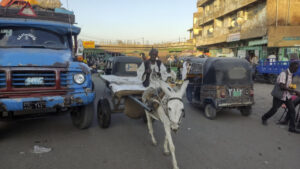Before the army and paramilitary fighters in Sudan started fighting each other last year, Ahmed used to sell gum arabic, which is an important ingredient for industries worldwide. However, since the war began, Ahmed has faced numerous challenges. He had to pay large sums of money to paramilitary forces to transport his gum arabic, and then the government demanded taxes on the product when it reached areas under their control. Even when the trucks finally reached the port for export, authorities asked for more taxes and higher storage fees. As a result, Ahmed’s gum arabic, along with many other Sudanese products, never made it onto a ship.

The war has had a devastating impact on Sudan’s economy. International trade fell by 23 percent, and the country’s finance ministry hasn’t set a national budget or provided regular reports. The exchange rate for imports and exports was raised, but it’s still much lower than the real value of the currency. Banks are mostly unavailable, and people rely on the black market for currency exchange, where the value of the dollar is much higher.
The war has led to the halt of production in various industries, destruction of businesses, and looting of food stocks. The World Bank stated that Sudan’s economic foundations have been widely destroyed, setting the country’s development back by several decades. Even after the fighting ends, the International Monetary Fund predicts that Sudan will face years of reconstruction.
Sudan had already suffered from a crippled economy for many years and was one of the world’s poorest countries. Under the previous regime, international sanctions and corruption hindered development, and the split of South Sudan further impacted the economy. The recent coup and subsequent collapse of the economy have worsened the situation. Millions of people have been internally displaced, and more than half the population relies on humanitarian aid to survive. The lack of government presence has affected all sectors, including agriculture, which used to be a significant contributor to the country’s GDP and employment.
The war has left a significant portion of agricultural land unusable, leading to the inability of farmers to tend to their crops. The consequences of the conflict are widespread, from wheat fields to gum arabic warehouses. Many businesses, including Ahmed’s, have been forced to close due to the dire economic situation.
